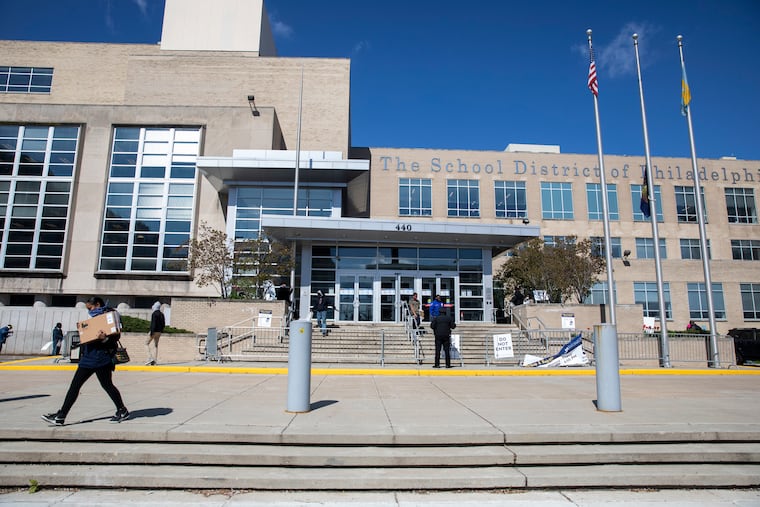Philly schools and students still need support despite online education successes | Opinion
PFT president Jerry Jordan: When students return to school buildings, their education must be more robust than ever.

In our years-long fight back against an education system that perpetuates profound inequity, we have often said: We didn’t get here overnight, but rather by decades of disinvestment. Over the past several years, our union has led the way as we’ve clawed our way back from the brink of destruction — fighting $1 billion in education cuts, nearly 4,000 layoffs, and toxic conditions in our school buildings. Steadily, we have been making real gains, and we’ve seen historic investments from both city and state entities.
And then, seemingly overnight, the bottom fell out. In a matter of hours, we had to pivot from an education system based on what our students need — face-to-face instruction, social interaction, and services for our vulnerable students — to a system that was undeveloped and remains inequitable.
Our educators have been building the plane while flying it — certainly, we are used to modifying what we do, adapting to changing circumstances and curriculum — but this was unprecedented. Students and educators left school one day and simply did not return to their buildings. Living rooms are now offices and classrooms, kitchen tables are now science labs, and educators and students alike are learning new platforms like Google Meet (and its ever-important mute button).
And what we’ve seen has been amazing — from counselors helping students navigate college decisions and emotional needs, to ed-tech members working to develop lessons for teachers, to paraprofessionals calling students to check-in, to school nurses volunteering as frontline workers, to the classroom teachers learning how to use entirely new technology, the efforts of the more than 12,000 members of the Philadelphia Federation of Teachers have been heroic.
But let’s be clear: The COVID-19 crisis has further exposed the glaring inequities in our education system. At the start of the crisis, we surveyed our membership and asked for their feedback regarding remote learning; and in the more than 5,400 responses, our members’ concerns were directly connected to equity issues like student internet and technology access. Further, members noted that students’ ability to use computers and programs now required for online learning is contingent upon having had school-based access to technology.
And when all is said and done, our most vulnerable students — those with special needs, those learning English, or those experiencing poverty — will be the ones who have suffered the most. With 80% of our students facing poverty, Philadelphia’s schoolchildren are among the most vulnerable in the nation to the profound impacts of this crisis.
Our response to the crisis must be reflective of who we want to be as a society. Quite simply, we must reject efforts to return to an austerity budget that mirrors the years of cuts from which our young people are still suffering. The long-lasting impacts — both in terms of learning regression and impacts of the trauma of this crisis — will require careful attention and resources.
And so, too, must we reject efforts to use this crisis as some twisted “proof” that online education works in some sustainable fashion, and we must reject the efforts of some parties to capitalize upon their unproven and deeply flawed voucher proposals. Relatedly, we must repudiate union-busting groups’ attempts to disenfranchise workers (like the Freedom Foundation’s recent solicitation to our members’ work emails urging them to drop their union membership). The labor movement’s solidarity is more important than ever, and it’s why the PFT is working collectively within the AFL-CIO to push for a holistic response to this crisis.
Further, as we look toward reoccupying our school buildings, we will not let the crisis of toxic schools be forgotten. Like the COVID-19 crisis, the toxic schools emergency is one that is acutely felt in communities experiencing poverty and in communities of color. We have been advocating for remediation work to take place during the closure, and we will continue to urge a serious investment from city and state leaders so that buildings are not only safe from COVID-19 but are also safe from toxins like lead and asbestos.
Collectively, we must roundly refuse the notion that we will be able to recover from this traumatic time by slashing budgets, by cutting services, or by shortchanging the contributions of educators. If we take a path of austerity, we will very quickly return to one of the darkest periods in our city’s history, during which the devastating impacts of budget cuts have negatively impacted so many of our young people.
When students return to school buildings, their education must be more robust than ever. Our collective vision for public education must not be diminished by the COVID-19 crisis. There will be talk about what we cannot afford post-COVID-19. But, fundamentally, there will always be funding for what we, as a society, prioritize. Our students must return to schools that are staffed with counselors, nurses, access to the arts, and all of the resources they need to learn, thrive, and move past the trauma of this terrible time. Quite frankly, we cannot afford anything less.
Jerry T. Jordan is the president of the Philadelphia Federation of Teachers.